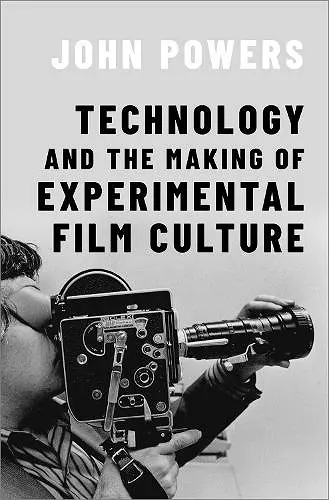Technology and the Making of Experimental Film Culture
Format:Paperback
Publisher:Oxford University Press Inc
Published:7th Sep '23
Currently unavailable, our supplier has not provided us a restock date
This paperback is available in another edition too:
- Hardback£71.00(9780197683385)

The Bolex camera, 16mm reversal film stocks, commercial film laboratories, and low-budget optical printers were the small-gauge media technologies that provided the infrastructure for experimental filmmaking at the height of its cultural impact. Technology and the Making of Experimental Film Culture examines how the avant-garde embraced these material resources and invested them with meanings and values adjacent to those of semiprofessional film culture. By reasserting the physicality of the body in making time-lapse and kinesthetic sequences with the Bolex, filmmakers conversed with other art forms and integrated broader spheres of humanistic and scientific inquiry into their artistic process. Drawing from the photographic qualities of stocks such as Tri-X and Kodachrome, they discovered pliant metaphors that allowed them to connect their artistic practice to metaphysics, spiritualism, and Hollywood excess. By framing film labs as mystical or adversarial, they cultivated an oppositionality that valorized control over the artistic process. And by using the optical printer as a tool for excavating latent meaning out of found footage, they posited the reworking of images as fundamental to the exploration of personal and cultural identity. Providing a wealth of new detail about the making of canonized avant-garde classics by such luminaries as Carolee Schneemann, Jack Smith, and Stan Brakhage, as well as rediscovering works from overlooked artists such as Chick Strand, Amy Halpern, and Gunvor Nelson, Technology and the Making of Experimental Film Culture uses technology as a lens for examining the process of making: where ideas come from, how they are put into practice, and how arguments about those ideas foster cultural and artistic commitments and communities.
In this book's four brilliantly designed chapters, Powers grounds postwar avant-garde film in key technologies....the technological elements of familiar experimental filmmakers....developed more deliberately than they have been in critical texts like Visionary Film, and Powers also introduces numerous less recognizable filmmakers and films. The archival scholarship is outstanding, as the critical contexts build 'film culture' out of author interviews, artist notebooks and statements, and different kinds of small-press, academic, and mainstream film and photography magazines. The book includes a generous selection of color plates, helpful extended definitions of each new technology, reproductions of photography ads, movie frames, and lab receipts, plus some fascinating details in extended footnotes. A major contribution to the study of North American experimental cinema. * Choice *
Dr. John Powers examines how the avant-garde embraced these material resources and invested them with meanings and values adjacent to those of semiprofessional film culture. * New Books Network *
John Powers' thoroughly-researched, carefully-structured new book has created an expanded context for the immense flowering of a cine-world I thought I knew--drawing me to new understandings, to filmmakers I shouldn't have ignored, and to films I forgot to remember. My watch list (and my syllabi) are under revision. * Scott MacDonald *
Picasso has been quoted as saying that when art historians get together they talk about form, structure, and meaning, but when artist get together they talk about the best place to buy turpentine. In Technology and Experimental Film Culture, John Powers bridges both worlds, showing how film stocks, the Bolex camera, film laboratories, and optical printers were not just the tools for experimental filmmaking but formed the core of artistic creativity and discovery. Through detailed accounts of the making and insightful analysis of the films, this book reveals new dimensions to avant-garde film. * Tom Gunning *
Far from Hollywood's big screens and expensive equipment, a family of small film technologies has long been transforming how movies help us to see, hear, think, feel, and create. In Powers' exciting book, this vibrant media ecology is on full view, animated by filmmakers driven to experiment and invent. From chemistry hacks to DIY optics, this vital exploration of analog technologies and artistic imagination casts anew the essential role of the American avant garde in our world of little machines. * Haidee Wasson *
Technology is in some sense the story of the avant-garde,' writes John Powers. In this fascinating book, he shows how thoroughly true this is, combining exacting research with nuanced insight into how experimental filmmakers work with and against industrial technologies. A major contribution to the field. * Erika Balsom *
The book includes a generous selection of color plates, helpful extended definitions of each new technology, reproductions of photography ads, movie frames, and lab receipts, plus some fascinating details in extended footnotes. A major contribution to the study of North American experimental cinema. Essential. * Choice *
ISBN: 9780197683392
Dimensions: 236mm x 157mm x 18mm
Weight: 449g
280 pages